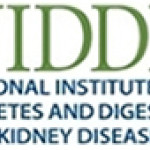- Industrie: Government; Health care
- Number of terms: 17329
- Number of blossaries: 0
- Company Profile:
The National Institute of Diabetes and Digestive and Kidney Diseases (NIDDK) conducts and supports research on many of the most serious diseases affecting public health. The Institute supports much of the clinical research on the diseases of internal medicine and related subspecialty fields, as ...
A condition in which the urine has more than normal amounts of a protein called albumin. Albuminuria may be a sign of chronic kidney disease. See urine albumin-to-creatinine ratio.
Industry:Health care
A waste product from protein in the diet and from the normal breakdown of muscles of the body. Creatinine is removed from blood by the kidneys; as kidney disease progresses, the level of creatinine in the blood increases.
Industry:Health care
Replacement of a diseased organ with a healthy one. A kidney transplant may come from a living donor, often a relative, or from someone who has just died.
Industry:Health care
The process of filtering wastes from the blood artificially. This job is normally done by the kidneys. If the kidneys fail, the blood must be filtered artificially. The two major forms of dialysis are hemodialysis and peritoneal dialysis.
Industry:Health care
A mineral found in many foods, such as beans, nuts, milk, and meat. Too much phosphorus in the blood pulls calcium from the bones.
Industry:Health care
A hormone produced by the kidneys to help the body absorb dietary calcium into the blood and bones.
Industry:Health care
Filtering the blood by using the lining of the abdominal cavity, or belly, as the filter. A cleansing liquid, called dialysis solution, is drained from a bag into the abdomen. Fluid and wastes flow through the lining of the abdominal cavity and remain “trapped” in the dialysis solution. The solution is then drained from the abdomen, removing the extra fluid and wastes from the body. The two main types of peritoneal dialysis are continuous ambulatory peritoneal dialysis and continuous cycling peritoneal dialysis.
Industry:Health care
Condition in which a proteinlike material builds up in one or more organs. This material cannot be broken down and interferes with the normal function of that organ. People who have been on dialysis for several years often develop amyloidosis because the artificial membranes used in dialysis fail to filter the proteinlike material out of the blood.
Industry:Health care
